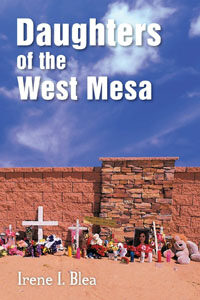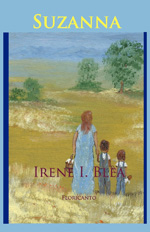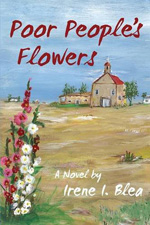Dr. Irene Blea is a native New Mexican with a Ph.D. in Sociology from the University of Colorado-Boulder and is the author of three novels, seven university text books, four poetry chapbooks, and over thirty academic articles. She developed and taught Mexican American Studies for twenty-seven years before retiring in 1998. In May 2009 she was recognized by the League of United Latin American Citizens (LULAC) of New Mexico for Outstanding Lifetime Achievement. Daughters of the West Mesa (ABQ Press, 2015) is her third novel. You can find Dr. Blea on LinkedIn, Facebook and her website IreneBlea.com.
 What is your elevator pitch for Daughters of the West Mesa?
What is your elevator pitch for Daughters of the West Mesa?
Daughters of the West Mesa is a work of fiction based on a true story of the discovery of 11 female remains, and an unborn fetus, west of Albuquerque. I fictionalized a single mother of two daughters; one of them has been missing for several months.
What do you hope readers will take away from it?
My goal is to humanize the impact of this serial killing on the families and the community from which the murdered women emerged.
Tell us about your main protagonist.
Dora is a single mother of two daughters who has struggled to negotiate out of poverty, while experiencing racism, sexism, family and religious resistance, and the embarrassment of having her daughter addicted and missing.
Did this work pose any unique challenges for you?
This work took me to some dark places in the lives of the murdered women, their families, the communities, and myself. At no time was I fearful, but I frequently was out of my comfort zone when I drove the dark streets were sex workers work at 1:00 or 2:00 a.m., and when I attended biker functions in biker bars.
What was the most difficult aspect of writing this book? The most satisfying?
The most difficult aspect was the pain of the mothers, fathers, children, aunts, uncles, cousins, and community. It was widespread. The most satisfying is that these hurting people were able to vocalize their experiences to me.
What kind of research did you do for the book?
I conducted a literature review on serial killers, especially those committing matricide. I read newspapers and Internet accounts of America’s unsolved serial killer mysteries, and visited the 100-acre dumping site a few times. I also attended indigenous prayer rituals, victim’s funerals and public information sessions that became rallies and protest sessions, toured the crime laboratory and interviewed victim’s family members and talked with Spanish-speaking media persons from Univision. I’ve kept a journal since 1979 and documented my experience.
Tell us more about putting together Daughters of the West Mesa.
It took two years to complete from beginning to end. This was one of those novels that demanded to be written. I wanted to write my third Suzanna novel, but Daughters of the West Mesa kept gnawing at me. In the editing process, we struggled through which Spanish words to italicize. It is difficult to accept that no matter how many times I edit my material, how many times two or three other persons read and commented on it, there were still errors and minor inconsistencies that needed to be addressed.
 Do you have a message or a theme that recurs in your writing?
Do you have a message or a theme that recurs in your writing?
Justice. The message in Daughters of the West Mesa is that the murdered women were not the only persons victimized. Those related to them suffered shame and disappointment, and felt victimized by legal and media representatives constantly referring to their loved one as drug addicted and prostitutes. This is a complex cultural issue that affected the community. I felt it needed a voice. In addition I did not want the case to go cold. It is important to keep it alive and find the perpetrator.
When did you know you were a writer?
I was born into a storytelling family, into a tradition that is Native American and northern New Mexico, mountain, Hispanic. At the age of seven I entered the public school system, learned to speak English, and fell in love with the magic of writing and reading. I did not like summer vacation from school. As a graduate student I wrote three different term papers for three graduate seminars. Thus, I am now aware of systematically, gradually, becoming a writer; there was no one pivotal moment.
Who are your favorite authors, and what do you admire most about their writing?
I enjoy the clarity and creativity of the magic realism of Central, South American and Spanish writers. Juan Rulfo and Pablo Neruda’s poetry is grounded and dynamic in such a forceful manner. Carlos Fuentes, Isabel Allende’s magical realism is intriguing and spiritual. Of course, what is not to love about the storytelling genius of the Nobel Prize winner, Miguel García Márquez. In addition, I admire the revolutionary nature of the highly influential work of Federico García Lorca.
How has your work as a poet influenced your fiction writing?
My love of language and code switching in ways that touch the heart and stir the soul is always there. I strive to be my most poetic self when I write about the land, the moon, the sun and the sky. I want the world to love and recognize all their relations: those that walk, crawl, swim, and fly.
What can fiction writers learn from nonfiction writers? From poets?
The truth is filtered through the storyteller’s lens, and that is their truth.
What is the greatest tool in your writer’s arsenal?
Being bilingual and tri-cultural, a Spanish-English speaking Native American that struggles to speak Italian.
 Looking back to the beginning of your writing career, what do you know now that you wish you’d known then?
Looking back to the beginning of your writing career, what do you know now that you wish you’d known then?
I wish I had known to write earlier in my life. I wish I had known to start young to write what I know as my truth with no concern about whether the work is commercial or not.
What is the best encouragement or advice you’ve received in your writing journey?
Write. Write what you know and research what you don’t.
What are you working on now?
I’m writing the third novel in the Suzanna series, untitled at this point (Suzanna was published in 2009, Poor People’s Flowers in 2014). The most difficult thing for me to write is titles. I cannot make up a title. It has to come from life; the life of my characters or my life. Thus, at this time I fail to have a title for the third Suzanna novel, but I have written five chapters.
Is there anything else you’d like readers to know?
Yes, the person next to you has a story to tell, and it is most likely unlike yours.
 KL Wagoner (writing as Cate Macabe) is the author of This New Mountain: a memoir of AJ Jackson, private investigator, repossessor, and grandmother. She has a new speculative fiction blog at klwagoner.com and writes about memoir at ThisNewMountain.com.
KL Wagoner (writing as Cate Macabe) is the author of This New Mountain: a memoir of AJ Jackson, private investigator, repossessor, and grandmother. She has a new speculative fiction blog at klwagoner.com and writes about memoir at ThisNewMountain.com.


Leave a Reply